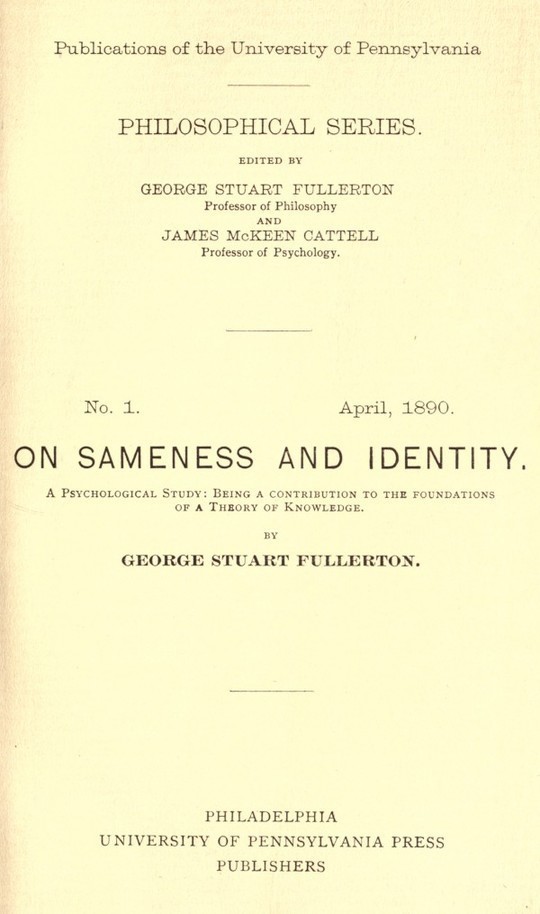
An Introduction to Philosophy
Free
Description
Contents
Reviews
Language
English
ISBN
Unknown
AN INTRODUCTION TO PHILOSOPHY
PREFACE
GEORGE STUART FULLERTON.
CONTENTS
PART I
CHAPTER I
PART II
PART III
PART IV
PART V
CHAPTER XIX
PART VI
NOTES
AN INTRODUCTION TO PHILOSOPHY
I. INTRODUCTORY
CHAPTER II
II. PROBLEMS TOUCHING THE EXTERNAL WORLD
CHAPTER III
CHAPTER IV
CHAPTER V
CHAPTER VI
CHAPTER VII
III. PROBLEMS TOUCHING THE MIND
CHAPTER VIII
CHAPTER IX
CHAPTER X
CHAPTER XI
IV. SOME TYPES OF PHILOSOPHICAL THEORY
CHAPTER XII
CHAPTER XIII
CHAPTER XIV
CHAPTER XV
V. THE PHILOSOPHICAL SCIENCES
CHAPTER XVI
CHAPTER XVII
CHAPTER XVIII
CHAPTER XIX
CHAPTER XX
CHAPTER XXI
VI. ON THE STUDY OF PHILOSOPHY
CHAPTER XXII
CHAPTER XXIII
CHAPTER XXIV
NOTES
CHAPTER I, sections 1-5. If the student will take a good history of philosophy, and look over the accounts of the different systems referred to, he will see the justice of the position taken in the text, namely, that philosophy was formerly synonymous with universal knowledge. It is not necessary, of course, to read the whole history of philosophy to attain this end. One may take such a text-book as Ueberweg's "History of Philosophy," and run over the summaries contained in the large print. To see how the conception of what constitutes universal knowledge changed in successive ages, compare Thales, the Sophists, Aristotle, the Schoolmen, Bacon, and Descartes. For the ancient philosophy one may consult Windelband's "History of the Ancient Philosophy," a clear and entertaining little work (English translation, N.Y., 1899).
CHAPTER II, sections 7-10. Read the chapter on "The Mind and the World in Common Thought and in Science" (Chapter I) in my "System of Metaphysics," N.Y., 1904.
CHAPTER III, sections 12-13. Read "The Inadequacy of the Psychological Standpoint," "System of Metaphysics," Chapter II. I call especial attention to the illustration of "the man in the cell" (pp. 18 ff.). It would be a good thing to read these pages with the class, and to impress upon the students the fact that those who have doubted or denied the existence of the external material world have, if they have fallen into error, fallen into a very natural error, and are not without some excuse.
CHAPTER IV, sections 15-18. See Chapters VI and VII, "What we mean by the External World," and "Sensations and 'Things,'" in my "System of Metaphysics." In that work the discussion of the distinction between the objective order of experience and the subjective order is completed in Chapter XXIII, "The Distinction between the World and the Mind." This was done that the subjective order might be treated in the part of the book which discusses the mind and its relation to matter.
CHAPTER V, sections 10-21. See Chapters VIII and IX, "System of Metaphysics," "The Distinction between Appearance and Reality" and "The Significance of the Distinction."
CHAPTER VI, sections 23-25. See Chapters X and XI, "System of Metaphysics," "The Kantian Doctrine of Space" and "Difficulties connected with the Kantian Doctrine of Space."
CHAPTER VII, sections 27-29. Compare Chapter XIII, "System of Metaphysics," "Of Time."
CHAPTER VIII, sections 30-32. Read, in the "System of Metaphysics," Chapters V and XVII, "The Self or Knower" and "The Atomic Self."
CHAPTER IX, sections 35-36. For a strong argument in favor of interactionism see James's "Psychology," Chapter V. I wish the student would, in reading it, bear in mind what is said in my chapter on "The Atomic Self," above referred to. The subject should be approached with an open mind, and one should suspend judgment until both sides have been heard from.
CHAPTER X, sections 40-42. See "System of Metaphysics," Chapters XXVII and XXVIII, "The Existence of Other Minds," and "The Distribution of Minds."
CHAPTER XI, section 44. See "System of Metaphysics," Chapter XV, "The World as Mechanism."
CHAPTER XII, section 48. The notes to Chapter III (see above) are in point here. It is well worth the student's while to read the whole of Chapter XI, Book IV, of Locke's "Essay." It is entitled "Of our Knowledge of the Existence of Other Things." Notice the headings of some of his sections:—
CHAPTER XIII, section 52. It is difficult to see how Hamilton could regard himself as a "natural" realist (the word is employed by him). See his "Lectures on Metaphysics," VIII, where he develops his doctrine. He seems to teach, in spite of himself, that we can know directly only the impressions that things make on us, and must infer all else: "Our whole knowledge of mind and matter is, thus, only relative; of existence, absolutely and in itself, we know nothing."
CHAPTER XIV, section 55. See "System of Metaphysics," Chapter XVI, "The Insufficiency of Materialism."
CHAPTER XV, section 60. The reader will find Descartes's path traced in the "Meditations." In I, we have his sweeping doubt; in II, his doctrine as to the mind; in III, the existence of God is established; in VI, he gets around to the existence of the external world. We find a good deal of the "natural light" in the first part of his "Principles of Philosophy."
CHAPTER XVI, sections 65-68. To see how the logicians have regarded their science and its relation to philosophy, see; Keynes's "Formal Logic" (London, 1894), Introduction; Hobhouse's "Theory of Knowledge" (London, 1896), Introduction; Aikins's "The Principles of Logic" (N.Y., 1902), Introduction; and Creighton's "Introductory Logic" (N.Y., 1898), Preface.
CHAPTER XVII, section 69. Compare with Professor James's account of the scope of psychology the following from Professor Baldwin: "The question of the relation of psychology to metaphysics, over which a fierce warfare has been waged in recent years, is now fairly settled by the adjustment of mutual claims. . . . The terms of the adjustment of which I speak are briefly these: on the one hand, empirical investigation must precede rational interpretation, and this empirical investigation must be absolutely unhampered by fetters of dogmatism and preconception; on the other hand, rational interpretation must be equally free in its own province, since progress from the individual to the general, from the detached fact to its universal meaning, can be secured only by the judicious use of hypotheses, both metaphysical and speculative. Starting from the empirical we run out at every step into the metempirical." "Handbook of Psychology," Preface, pp. iii and iv.
CHAPTER XVIII, section 71. The teacher might very profitably take extracts from the two chapters of Whewell's "Elements of Morality" referred to in the text, and read them with the class. It is significant of the weakness of Whewell's position that he can give us advice as long as we do not need it, but, when we come to the cross-roads, he is compelled to leave the matter to the individual conscience, and gives us no hint of a general principle that may guide us.
CHAPTER XIX, section 74. The student who turns over the pages of several works on metaphysics may be misled by a certain superficial similarity that is apt to obtain among them. One sees the field mapped out into Ontology (the science of Being or Reality), Rational Cosmology, and Rational Psychology. These titles are mediaeval landmarks which have been left standing. I may as well warn the reader that two men who discourse of Ontology may not be talking about the same thing at all. Bear in mind what was said in section 57 of the different ways of conceiving the "One Substance"; and bear in mind also what was said in Chapter V of the proper meaning of the word "reality."
CHAPTER XX, sections 76-77. One can get an idea of the problems with which the philosophy of religion has to deal by turning to my "System of Metaphysics" and reading the two chapters entitled "Of God," at the close of the book. It would be interesting to read and criticise in class some of the theistic arguments that philosophers have brought forward. Quotations and references are given in Chapter XXXIV.
CHAPTER XXI, sections 78-79. What is said of the science of logic, in Chapter XVI, has, of course, a bearing upon these sections. I suggest that the student examine a few chapters of "The Grammar of Science"; the book is very readable.
CHAPTER XXII, sections 80-82. The reader will find in lectures I and II in Sir William Hamilton's "Lectures on Metaphysics" a discussion of the utility of philosophy. It has a pleasant, old-fashioned flavor, and contains some good thoughts. What is said in Chapters XVI-XXI of the present volume has a good deal of bearing upon the subject. See especially what is said in the chapters on logic, ethics, and the philosophy of religion.
CHAPTER XXIII, sections 83-87. There is a rather brief but good and thoughtful discussion of the importance of historical study to the comprehension of philosophical doctrines in Falckenberg's "History of Modern Philosophy" (English translation, N.Y., 1893); see the Introduction.
CHAPTER XXIV, sections 88-93. I hardly think it is necessary for me to comment upon this chapter. The recommendations amount to this: that a man should be fair-minded and reasonable, free from partisanship, cautious, and able to suspend judgment where the evidence is not clear; also that where the light of reason does not seem to him to shine brightly and to illumine his path as he could wish, he should be influenced in his actions by the reflection that he has his place in the social order, and must meet the obligations laid upon him by this fact. When the pragmatist emphasizes the necessity of accepting ideals and living by them, he is doing us a service. But we must see to it that he does not lead us into making arbitrary decisions and feeling that we are released from the duty of seeking for evidence. Read together sections 64, 91, and 93.
INDEX
*** START: FULL LICENSE ***
Section 1. General Terms of Use and Redistributing Project Gutenberg-tm electronic works
Section 2. Information about the Mission of Project Gutenberg-tm
Section 3. Information about the Project Gutenberg Literary Archive Foundation
Section 5. General Information About Project Gutenberg-tm electronic works.
The book hasn't received reviews yet.











